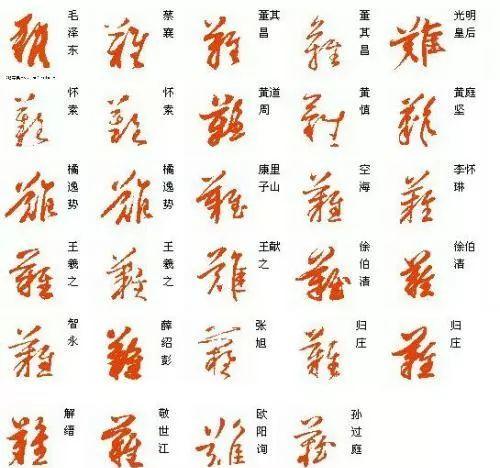Difficult nán, not easy, and laborious to do.
Today we come to know the word "difficult nán".
【Glyph evolution】
堇, which is both the sound side and the shape side, is "茣", which means the capital punishment of hanging or burning. Difficult, Jin Wen (堇, capital punishment) (Falcon, Falcon, Carnivorous Raptor), indicates the punishment of bird pecking.
【Calligraphy Masters】

【Definition of words】
〈Shape〉
(Shape sound.) Sound from falcon (zhuī)? From falcons, it is related to birds. Meaning: winged bird. Pretending to be difficult)
Difficulty; Tough; Not easy
If it is not late for weaving, it is difficult for the king's wife to do it. ——" Yutai Xinyong Ancient Poems for Jiao Zhongqing's Wife"
The difficulty of the Shu Dao is difficult to go to the qingtian. —— Li Bai, "Shu Dao Difficulty"
Not; Not good
Huan Tan made a theory, and it was difficult to navigate the weak water. - Han · Wang Zhen's "Spiritual Altar Inscription"
〈Move〉
Embarrassment, fear of difficulty; Feel difficult
Today, the multitude is too many to be difficult and lasting. (Difficult with, "difficult with" omitted.) Zhi refers to Cao Jun. ——Zizhi Tongjian
Unpredictable also. - "The Ten Years of Zuo Chuan Zhuang Gong"
The iron coat was cold. --Don S. Cen Shan, "White Snow Song Sends the Military Judge Back to Beijing"
Make it difficult
Now it is not a courtesy to the guard, and the king of the clan is difficult to give up. - "The Left Handbook"
fear
Therefore, it is not difficult for a gentleman to be respectful. - "Xunzi Jundao". Note: "It's hard to read, and I'm afraid."
respect
It is not difficult not to be broken, and it is not blessed to be blessed. - "Poetry Xiaoya Sanghu"
【The Story of the Word】
Untitled, it is difficult to say goodbye when we meet
Tang Li Shangyin
It is difficult to say goodbye when we meet, and the east wind is powerless.
Spring silkworm to the end of the dead silk, the wax torch into gray tears began to dry.
Xiao Jing but sad clouds changed, night groan should feel the cold moonlight.
Pengshan has no more roads to go, and the blue bird is attentive to visit.
Translation: The opportunity to meet is really rare, and it is even more difficult to give up when they are separated, and it is also the twilight spring weather that the east wind will harvest, and the flowers are broken, which is even more sad. The spring silkworm cocoons until they die, and the wax oil like tears when the candle is burned to ashes can drip dry. The woman put on makeup in the morning and looked in the mirror, only worried that the rich sideburns would change color and the youthful appearance would disappear. Men groan at night and must feel the cold moon invading people. The other party's residence is not far from Penglai Mountain, but there is no way to go, and it is out of reach. I hope that there will be messengers like blue birds who will be attentive to visiting my lover for me.
Interpretation: In the Tang Dynasty, people advocated Taoism and believed in Taoism. When Li Shangyin was fifteen or sixteen years old, he was sent by his family to Yuyang Mountain to learn the Tao. During this period, he met and fell in love with Song Huayang of the Lingdu Guan female clan of Yuyang Mountain, but the feelings of the two could not be known to outsiders, and the author's heart was gushing with irrepressible love, so he could only record the love with poetry and hide its title, so that the poem appeared to be both hazy and elegant, and infinitely affectionate.
The whole poem uses the word "other" in the sentence as the whole text, describing the pain of the parting of a pair of lovers and the thoughts after the parting, expressing the incomparably sincere feelings of parting in love, but it also reveals the poet's political frustration and spiritual sullenness, with a strong sad color, writing about the depth of grief and mourning pain, and expressing the incomparable love and deep thoughts of the lovers in their hearts through myths and legends.